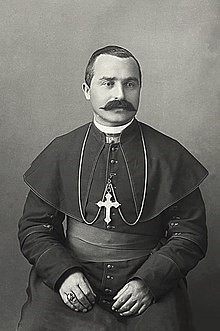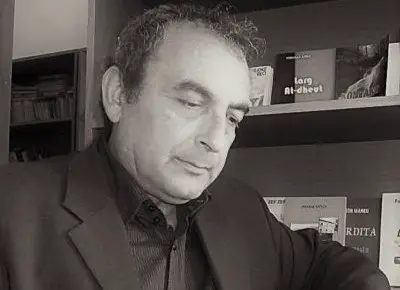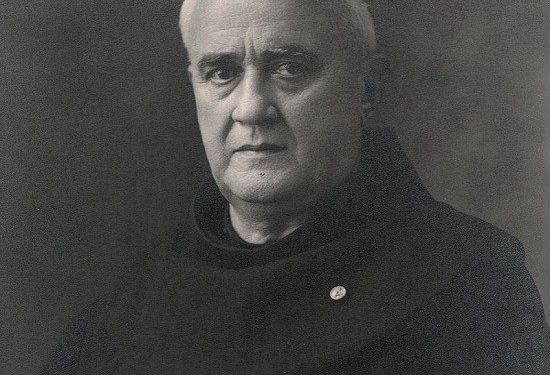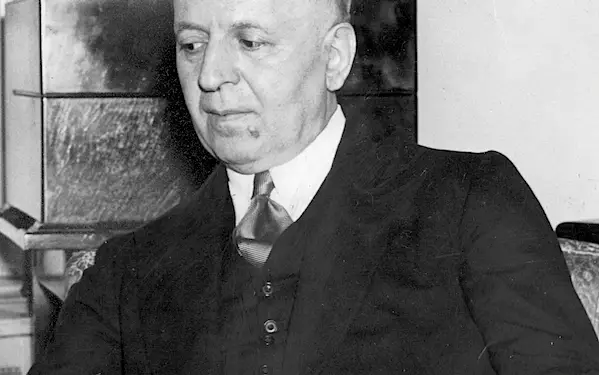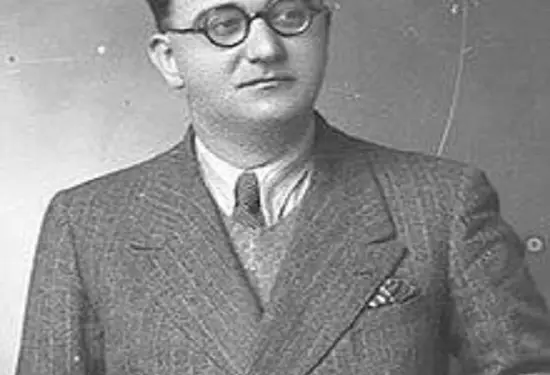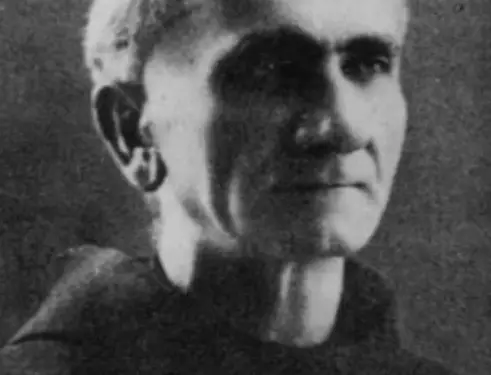From Ndue Dedaj
– Abbot Prend Doçi, may seem more distant in time, but it is the same ideological approach of his exclusion from the crippled pantheon of the culture of this country, for half a century (1944-1990). –
Memorie.al / Abbot Prend Doçi (1846-1917), leader of the Albanian national movement, is a name and work that calls today all day long, for history to be rewritten, each event and historical figure taking the place it deserves. This is what happened to all the figures of the nation, who, due to the Marxist-Leninist ideology, were excluded from our historical heritage. Now we are no longer impressed by the great comebacks, like; Fishta, Konica, Kokalari, and finally Kostë Çekrezi, but we still stay away from Ernest Koliq, Mustafa Kruja, Anton Harapi, Mit’hat Frashër, even though they are the founders of our national consciousness.
The stain in their political biography continues to define fate again as figures of history and culture, do you say that the characters of the history of Europe have all been drained, from the first day to the last day of their political activity.
Abbot Prend Doçi may seem more distant in time, but it is the same ideological approach of his exclusion from the crippled pantheon of this country’s culture for half a century (1944-1990). A pious revivalist dedicated to freedom, initiation and Independence, and his holy trinity remained on the nation’s altar.
A complex figure of his time, according to Shahin Kolonje; “much mentioned and little known”, with unusual influence in the political, ecclesiastical, diplomatic and cultural circles in the last three decades of the 19th century and the first two decades of the 20th century.
For Father Doči, protected by the traits of a statesman, there was no impossible mission, no matter how difficult it was, an apostolic or cultural mission, in Canada or in India, in Shkodër or in Mirdita, in war or in peace, a priest of simple, or ordinary church. He was a courageous innovator and reformer, in all areas of development: in church life, in social life, in cultural and political life. The only Albanian who lived and preached on three continents: Europe, Asia and America.
Abbot is an ancient ecclesiastical title in Albania, as well as in England, France, Spain, Italy, Poland, etc., but among Albanians, it is mainly associated with one name, that of Monsignor Prend Doçit, which does not diminish the role of others, not even the last abbot of Mirdita, Monsignor Frano Gjini, who was also a Bishop and above all a “Blessed Martyr”.
Doçi is unique as he was the renaissance Abbot, with “pen in hand and rifle for cheek”, as Fishta would define it. Because of his involvement in politics, he did not receive the title of bishop, and because he performed episcopal functions and was perhaps more publicly and internationally known than the archbishops of Shkodra themselves.
It has been a hundred years since the Abbot died in Orosh, in suspicious circumstances of the First World War (it was the Austro-Hungarian occupation), while his name has only been illuminated, as well as his extensive work, honored to end and with the title “Honour of the Nation”. The veteran researcher Pal Doçi, the contemporary German historian Peter Bartl, at the University of Munich, the scrupulous researcher Luigj Martini from Shkodër, etc., have carried out studies about this eminent figure of the Albanian world in the last 30 years, in addition to the statements made from time to time around Abati, from Father Pashk Bardhi, Jup Kastrati, Tomor Osmani, Mark Tirta, etc.
Without being postponed until the time when he lived, where his role was expressed by the entire elite of the time, including Edith Durham, who made a portrait of the baron from the heights of the Holy Mountain of Oroshi, where she had climbed to talk to one of the highest people in Albania, as Abati appreciates.
Prend Doçi, was a high missionary of religion, a little flag bearer of freedom, an ideologue of Independence and a national activity of knowledge, etc. As a missionary and prelate of the Catholic Church, after a series of religious contributions in America and Asia (India), he reformed the Mirdita Abbey, from 1888, when he took over, until 1917, when he passed away, staying at its head for 29 years and “purifying his diocese from vice”, as contemporaries wrote.
Oroshi Abbey was nullius (independent), otherwise directly subordinated to the Vatican. Monsignor Doçi found it fragmented, with only two parishes, and soon he did it with 16 such, in a wide territory from Mati to Drin, extending the abbey organization (over Orosh and Spaç) to Nterfana, Kalivare, Qafë-Mali, Blinisht, Fand e, up to Kashnjet, Mnelë and Gomsiqe.
Under his care and authority, the cult institutions in the province of Mirdita became modern, starting with the Abbey building. The abbot was a multifaceted missionary of the European format, determined to civilize his country, by all means and means, by preaching in the church, national liberation from Turkish slavery, opening schools in the mountains, publishing books, designing the unified alphabet, the collection of the cultural visar that was falling apart, etc.
He, as rarely anyone, intertwined his political goals with those of the church and social-cultural progress. As a church leader, he would act among 25 thousand mirditas, where only five percent of them could read and write, blood feud was a gangrene of the population, poverty as well.
Doçi wisely cooperated with the Gjomarkaj (Markagjon), the captain princes, leaving behind the disputes and conflicts that his predecessors had with the traditional rulers of the Krahina, who lived between Oroshi and Shkodra. Abbot and Prince, not by chance, had the same fate, exiled from the High Gate, Monsignor Doçi, 12 years and Prengë Bibë Doda, 28 years.
As an inspiration and flag bearer of the freedom of the homeland, Abat Doçi is among the rare Albanians with a leading role in the movements for freedom and independence, for forty years, from the Mirdita uprising of 1876, to the independence uprisings of 1910-1912, in Northern Albania, until the First World War, could and as one of its political victims. He cooperated closely with emblems of the popular resistance, such as Dede Gjo Luli and other national activists, for freedom.
His journey to freedom, described by Franz Nopça, begins with his arrest in Guci, by the Turkish authorities, his transfer to Constantinople and his release on bail, so that he would not engage in politics, for which he “went” on a religious mission for 6 years, in Canada, in the remote northern American islands, as I said, at the end of the world. Except for Doci’s renaissance project, it could be delayed, but it could not be stopped, and at war with everyone.
The written and unwritten chronicle of his vicissitudes for the return to the Motherland, as a religious missionary, where within the ecclesiastical garment, was also the patriot, “the national treasure of our mountains”, as the famous writer and historian, Ndoc, would describe him is enough. Nikaj. There was no crest of history more appropriate than Mirdita, for its political, religious and cultural action.
Doçi led two headquarters, one in Orosh, as the head of the church of Mirdita, and the other in Shkodër, as the head of the well-known society “Bashkimi”, but his ideal was Albania, in its entire ethnic space, where he is known and as drafter of a memorandum for the Chamber. Abati and Mirdita were a historical symbiosis, especially since the Mirditas were known as the most powerful warrior tribe in Northern Albania. Thus he traveled for a long time with two “legs”, firmly leaning on the inflexible centrist, doctrinal Mirdita and the intellectual Shkodra, radiant with European civilization.
As an ideologue and activist of the National Renaissance, Abati created the Literary and Linguistic society “Bashkimi” in Shkodër, in 1899, with collaborators such personalities as; Father Gjergj Fishta, Dom Ndoc Nikaj, Luigj Gurakuqi, Dom Dodë Koleci, etc., which is rightly called “academy” by Gurakuqi, in a statement with De Rada. This elite society, for more than a decade, dealt with the alphabet (of Manastir), the opening of schools, the publication of school books, about 35 works (Albanian-Italian dictionary, grammar, primer, history, geography, etc.)
Doci’s intelligence and literary talent stood out since he was a theology student in Rome and wrote the first patriotic lyrics, such as; “Albania under the Turkish yoke”, “A dedication to Albanians”, or its inclusion in a poetic collection of Albanians, dedicated to Dora D’Istria (Elena Gjika), prepared by Dhimitër Kamarda. The Arbëreshes were the “indestructible blood” for Albanians across the Adriatic, who came there from time to time, from Prend Doçi, to Martin Camaj, etc., to enjoy the old wine of inherited Albanian.
A lot has been said and written about “Abbat”, this enlightened knight of the Renaissance, who will continue to be identified like no other with this name, to whom he gave a new meaning among Albanians, beyond the title of ecclesiastical prelate, but no matter how much is said is written for the Reverend, the motive of every honor is found in the words of Gjergj Fishta: “The abbot has a great merit before the Fatherland and the Nation”. Memorie.al




